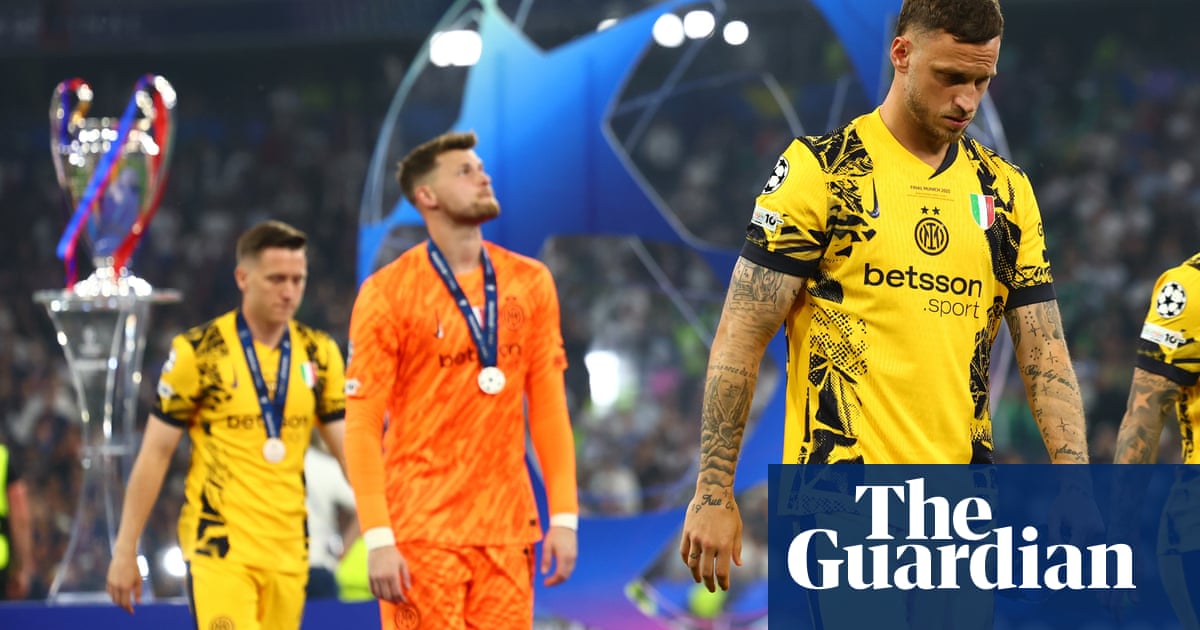They stay just long enough to see the trophy lifted. Most have discarded their losing medals by the time the pyrotechnics go off and Marquinhos raises the European Cup into the muggy Munich night. There is a watery smattering of applause. Then, with a turn of pace so sadly lacking during the game itself, they turn and head for the tunnel, past a battalion of photographers whose lenses are facing in the opposite direction.
What does it feel like tolose a Champions League final 5-0?Right now, and possibly for many years to come, this Inter team will be the only ones who know. Many of their fans were weeping uncontrollably in the stands, in the concourses, all along the road that leads back to the Métro station. For the 22 players and thousands of supporters who crossed the Alps so full of dreams, this is the sort of sporting trauma that defines generations.
It will not matter now, or ever, that this team have reached two finals in three seasons and lost them both to state-owned investment funds. There can be pride in the journey, but the greatest Inter sides were never satisfied with a journey, least of all a journey that now feels like a cruel trick of the light. What happened here was nothing less than a humiliation, a playground hazing on the biggest stage, and there is frankly no way of saying how any human, let alone any team, really gets over that.
Inter will make you sweat and suffer. Inter will run you down. Inter will fight and scrap for every last inch of turf. Inter will defend their penalty area with blood. Inter’s last three games in this competition: 3-3, 4-3, 0-5. The age and weariness of this squad we knew about. The sense in recent weeks of a team coming apart at the edges, this we knew too. But rarely have any club, in a match of this magnitude, found their veryideaso violently shattered. Inter did not just lose a final here; they lost a piece of themselves.
And so we finally discovered the limits of old-school grit and guts against a kind of footballing superintelligence, simply a more highly evolved form of the game.Paris Saint-Germaindid not simply attack more inventively and defend more intelligently; they won all the bits in between. The tactical fouling (13 fouls to seven despite dominating possession). The shithousery. They won the contact and the second balls. In a way this was a kind of machine warfare, total football in its most literal sense, against which Francesco Acerbi’s lucky white boots – with a hole in the big toe – proved desperately inadequate.
The plan, such as it existed, was to cut off the supply to Ousmane Dembélé whenever he dropped deep. So Dembélé simply stopped dropping deep. Instead he peeled wide, into the spaces behind the wingbacks, decoy runners darting and shifting around him, a team defined less by technical skill than a kind of tactical fission. Barcelona, whomInter beat in the semi-final, will keep doing the same things again and again. Paris will do something new with every attack, will try every key on the ring until it locates the one that will dismantle you.
In possession, Inter were simply devoured. The back three were sadistically hunted, the midfield had too much ground to cover and, with Inter having two underemployed strikers up the pitch, PSG always had numbers over. Their first goal came from the right-back Achraf Hakimi tapping the ball into an empty net from six yards. Already you could see Inter’s players shooting each other puzzled looks. Hang on. If their right-back has a tap-in from six yards, then what exactly is the point of us?
Perhaps Inter’s only hope was to sit in, to soak up pressure, to keep the score down for as long as possible. Instead they kept getting caught on the counter, a recurring waking nightmare in which Désiré Doué kept running clear on goal. Later Bradley Barcola came on and basically ended Acerbi’s career, a sensational piece of skill that sent him wriggling and sprawling across the turf like a giant woodlouse turned over on to its back.
Sign up toFootball Daily
Kick off your evenings with the Guardian's take on the world of football
after newsletter promotion
And so the weirdest ofChampions Leagueseasons ends with its most grotesque final. For Inter, the end of the road, and in more ways than one. Simone Inzaghi said he would consider his future after this game, but what future does this team really have? Acerbi is 37, Yann Sommer and Henrikh Mkhitaryan 36. Even their “young” players – Alessandro Bastoni, Marcus Thuram – aren’t actually that young. Sooner, and not later, a new side will have to be assembled on the bones and ashes of this.
The rebuild will be long, painful and fitful. The investment fund owner, Oaktree Capital, is operating a trimmer, more sustainable youth-focused model. Inzaghi may well end up in Saudi Arabia before long. Inter are now a small fish, feeding in a pond of nation states and super-marques. And now they will have to reinvent themselves in the shadow of one of their greatest humiliations. If ever a night encapsulated their new, smaller place in the world, it was this.
